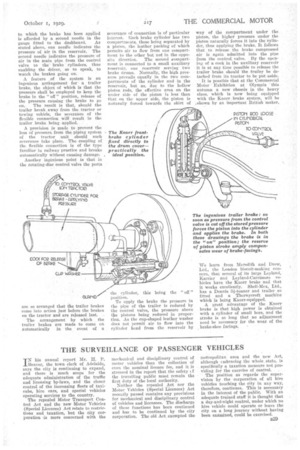THE SURVEILLANCE OF PASSENGER VEHICLES
Page 63

If you've noticed an error in this article please click here to report it so we can fix it.
IN his annual report Mr. U. P. Beaver, the town clerk of Adelaide, says the city is continuing to expand, and there is much scope for the adequate administration of the traffic and licensing by-laws, and the closer control of the increasing fleets of taxicabs, hire cars, and special vehicles operating services to the country.
The repealed Motor Transport Control Act and the new -Motor Vehicles (Special Licences) Act relate to restrictions and taxation, but the city. corporation -is more concerned with the
meehanical and disciplinary control of motor vehicles than the collection of even the nominal licence fee, and it is stressed in the report that the safety tf the travelling public must remain the first duty of the local authority.
Neither the renealed Act nor the Motor Vehicles (Special Licences) Act recently passed contains any provisions for mechanical and disciplinary control of vehicles and licensees. The discharge of these functions has been continued and has to be continued by the city corporation. The old Act exempted the metropolitan area and the new Act, although embracing the whole state, is specifically, a taxation measure not pro viding for the exercise of control. .
The position as regards the supervision by the corporation of all hire vehicles touching the city in any way, therefore, continues. This is necessary in the interest of the public. With an adequate trained staff it is thought that a day-and-night control, under which no hire vehicle could operate or leave the city on a long journey withent having been examined, could be exercised.






















































































































